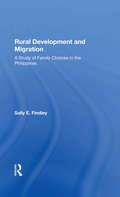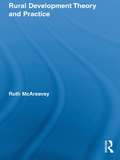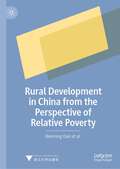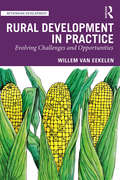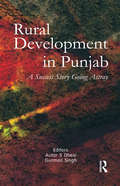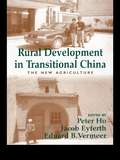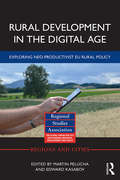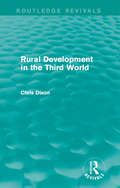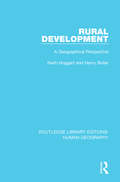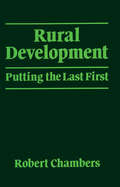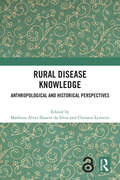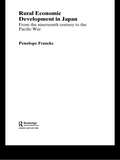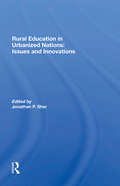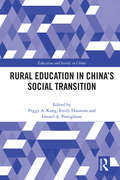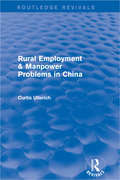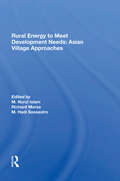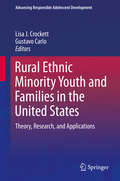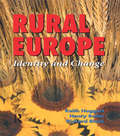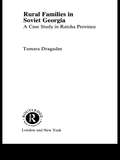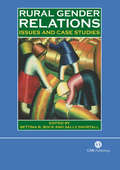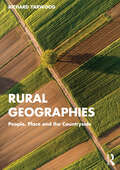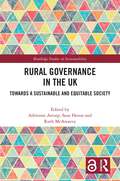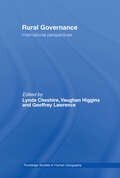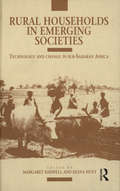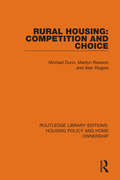- Table View
- List View
Rural Development And Migration: A Study Of Family Choices In The Philippines
by Calvin Goldscheider Sally E. FindleyPerhaps because I grew up on a farm in Ohio, I have long been interested in rural development. Although I fll'St became a migrant at the age of 17 when I left the farm to continue my studies in a city college, I was not aware of the relation between rural development and migration until many years later when I began studying patterns of urban and rural poverty. This research has grown out of my continuing investigation of the ways that migration .has been seen as both a response to chronic conditions of rural poverty and a factor potentially exacerbating urban poverty conditions. If governments wanted to deal with urban poverty, they would want to restrict urban in-migration, yet if they reduced urban in-migration, this would remove one of the important means available to persons seeking to raise themselves out of rural impoverishment. This would clearly be a no-win situation for the rural poor; the only way to deal fairly with both urban and rural poverty would be to foster socio-economic development of rural areas. Thus, I became interested in studying the patterns of rural development which actually have had an effect on the migration decisions of rural families.
Rural Development Theory and Practice (Routledge Studies in Development and Society)
by Ruth McAreaveyRural development is inherently viewed as a positive thing; it is seen as something that brings together groups of individuals with automatic positive implications and outcomes. Policy rhetoric frequently uses popular terms such as involvement, participation and power sharing to describe rural development activities. However, the reality of experience on the ground does not necessarily concur with these ideals. It is not always clear who ultimately benefits from rural development: the State, the community or rural development practitioners. This book critically analyses key concepts associated with rural development policy and practice, and using the concepts of power and micro-politics to analyze rhetoric and reality, reveals the intricacies of rural development. Challenging popular ideals associated with rural development, this book presents the notion of rural development less as a spontaneous, all-inclusive affair and more as a limited, controlled and exclusive process. Ultimately it contends that within structures of rural governance, a regeneration power elite predominates development and regeneration activities.
Rural Development in China from the Perspective of Relative Poverty
by Wenrong QianThis book provides a broad survey of Chinese rural households at a time of rapid change in China’s rural economy, examining the dual identity of households as consumers as well as producers of goods in terms of supply and demand. Based on the results of the China Rural Household Panel Survey (CRHPS) by Zhejiang University, this book analyzes four types of economic activities of rural households in China, particularly considering changes at the micro level. It examines how households strive to maximize family efficacy through input-output production decision-making in allocating limited resources. Examining data pertaining to agricultural production, land exploitation, migration and nationalization, as well as changes in economic behavior, this book offers a snapshot of the current situation of rural households in China and suggestions to improve living standards and related policies.
Rural Development in Practice: Evolving Challenges and Opportunities (Rethinking Development)
by Willem van EekelenRural Development in Practice focuses on the evolving nature of rural development in the Global South. It outlines how we got to where we are today, checks what we can learn from history, and explores the development drivers, facilitators, and obstacles most likely to shape the years ahead. The book covers the management of fishing grounds, forests, grazing lands, water sources and soil, and looks at the effects of infrastructure, trade mechanisms, and new crop varieties on farming. The author discusses the opportunities and challenges of microfinance, social safety nets and migration, and assesses the way ICT and climate change are changing everything, rapidly. Real-life examples, exercises, role-plays, textboxes, anecdotes, and illustrative artwork are used to bring concepts and theories to life, and every chapter concludes with a section that explores how best to tackle the tough and complex dilemmas of our time. Rural Development in Practice is essential reading for students at all levels and may be of benefit for programme and policy staff in rural-focused government departments, multilateral agencies, and non-government organisations.
Rural Development in Punjab: A Success Story Going Astray
by Autar S. DhesiFor many years, agricultural development in Punjab symbolised one of the most successful experiments in rural development. However, this success story seems to be going astray. The crux of the problem, this volume suggests, is that externally driven modernization to meet national food needs pushed Punjab into highly specialized production of wheat and rice, resulting in over-utilisation of natural resources with adverse environmental consequences that jeopardizing the long-term viability and sustainability of the agrarian economy. Stagnating productivity, reduced farm size, falling household incomes, depleting groundwater resources, are only a few of the problems that characterise Punjab’s agriculture today. The book establishes clearly that rural development implies more than transformation of traditional agriculture. Apart from ensuring efficient use of limited resources to sustain agricultural production, rural policy should encompass promotion of non-farm activities, investments in social and economic structure and civic amenities.
Rural Development in Transitional China: The New Agriculture
by Peter Ho Jacob Eyferth Eduard B. VermeerSince the late 1970s, China has experienced the most rapid social and economic changes in world history. Over 200 million rural inhabitants were lifted out of absolute poverty and tens of millions became wealthier than the average urban resident.This book offers an authoritative and in-depth analysis of the social and economic changes that have swept through the Chinese countryside. Topics covered include: land tenure and rural labour, social welfare, poverty alleviation, rural resettlement, food security, natural resource management and rural industrialization.
Rural Development in the Digital Age: Exploring Neo-Productivist EU Rural Policy (Regions and Cities)
by Edward Kasabov Martin PěluchaRural Development in the Digital Age explores current theoretical and policy developments in EU rural policy during the 4.0 period. The book offers an analysis of the contradictory and complex drivers and multiple impacts of Period 4.0 policy within the specific territorial context of its implementation. It is commonly agreed within academic and policy circles that the contexts, trends, drivers and impacts which are currently morphing have the potential to determine the nature and boundaries of rural areas in the longer-term. The authors examine inconsistencies in the design and implementation of EU rural development policy driven largely by intensifying neo-productivist pressures. The importance and novelty of the book lie in defining and critically examining the territorial impacts of neo-productivism as an ideology, a practice and a set of policy imperatives during the EU’s 2014-2020 programming period. The authors argue that such a paradigm shift in EU rural policy may reduce its effectiveness and ability to meet its goals of balanced territorial development and cohesion. This book will be of interest to advanced students, researchers and policymakers in rural policy, regional studies, economic geography and EU policy.
Rural Development in the Third World (Routledge Revivals)
by Chris DixonThe rural landscape of the Third World is generally seen as one worked by the impoverished. Chris Dixon shows that this is an increasingly inaccurate picture. Wealth does exist, with the landed often maintaining lifestyles comparable to their richest urban neighbours. And while land remains the basis of real wealth, the rural workforce is diversifying its activities away from agriculture becoming involved in a range of manufacturing, processing, trading and service industries. Yet still rural poverty persists, and the book illustrates just how difficult it is to assess the success of development initiatives adopted to eliminate it. This book, first published in 1990, provides a general introduction to the approaches, policies, and problems associated with Third World rural development. Rural Development in the Third World is relevant to students of geography, the environment and developmental issues.
Rural Development: A Geographical Perspective (Routledge Library Editions: Human Geography #10)
by Keith Hoggart Henry BullerThis book, originally published in 1987, provides an integrative, analytical aproach to rural areas in advanced economies. Causation and the consequences of societal change have been emphasised, in a framework which draws out processes which oeprate at different geographical scales (and with varying intensities across space).
Rural Development: Putting the last first (World Development)
by Robert ChambersRural poverty is often unseen or misperceived by outsiders. Dr Chambers contends that researchers, scientists, administrators and fieldworkers rarely appreciate the richness and validity of rural people's knowledge or the hidden nature of rural poverty. This is a challenging book for all concerned with rural development, as practitioners, academics, students or researchers.
Rural Disease Knowledge: Anthropological and Historical Perspectives
by Christos Lynteris Duarte da Silva, Matheus AlvesRural Disease Knowledge examines the ways in which knowledge of rural spaces and environments, on the one hand, and infectious diseases, on the other, have become inter-constituted since the late nineteenth century. With contributions by leading anthropologists and historians of medicine, it examines the epistemic co-constitution of the rural and of infectious diseases. Ranging from Brazil, Argentina, and Colombia to Java, Tanzania, West and South Africa, and Britain, the chapters cover diverse geographies, timelines, and diseases, including plague, brucellosis, leishmaniasis, yaws, yellow fever, nagana, sleeping sickness, and Chagas disease. The book considers how human interactions with infectious diseases have impacted ways of knowing and acting on rural spaces and environments, and in turn how human interactions with rural spaces and environments have impacted ways of knowing and acting against infectious diseases. It reflects on how the rural has been configured as a space of either health or sickness over the centuries and around the globe, the role of rural landscapes in the epistemic emergence of microbiology and tropical medicine, and the interaction with global processes such as European imperialism, the emergence of capitalism, and postcolonial nation-building projects. The studies engage with current debates on decolonizing knowledge and highlight how local disease knowledge has troubled and unsettled hegemonic medical perspectives and created new ways of understanding the relationship between diseases and rural spaces and environments. The volume will be of particular interest to scholars of medical anthropology, global health, and the history of medicine.
Rural Economic Development in Japan: From the Nineteenth Century to the Pacific War (Routledge Studies in the Modern History of Asia #Vol. 32)
by Penelope FrancksIn the historical literature on Japan, rural people have tended to be regarded as the exploited victims of the industrialisation process. This book provides an alternative view of the role and significance of the rural economy in Japan’s emergence as an economic power prior to World War II. Using theories and approaches derived from development studies and economic history the book describes the nineteenth-century development of a diversified, proto-industrial rural economy, focusing on the strategies employed by households as they sought to secure and improve their livelihoods. The book argues that rural people, through their ‘industrious revolution’, played an active part in determining the course of Japan’s agrarian transition and, eventually, the distinctive features of industrial Japan’s political economy, with the result that rural life still figures largely in the reality and imagination of contemporary Japan.
Rural Education In Urbanized Nations: Issues And Innovations
by Jonathan P SherA reversal in rural-to-urban migration patterns is creating increasing interest in the quality of education in rural areas and in techniques for meeting educational needs in sparsely populated regions. Wholesale urbanization of rural schools generally is rejected as a potential solution: it is logistically inefficient; centralization and standardization are met with growing resistance; and conventional solutions to educational problems produce uneven results when applied to rural areas. This book addresses the broad spectrum of rural education issues within OECD member countries. The authors identify innovative programs, policies, and strategies and point toward the more promising paths for rural school improvement. They also issue warnings about some of the blind alleys and dead ends that can be encountered. The major topics covered include delivery systems, in-school innovations, support mechanisms, and community-school linkages.
Rural Education in China’s Social Transition (Education and Society in China)
by Peggy A. KongIn the first decade of the twenty-first century, the People's Republic of China experienced dramatic growth and expansion that altered the educational environment of children. Rapid economic development increased prosperity and educational opportunities for children expanded in a wealthier society. Yet, a by-product of rising wealth was rising inequality. While the children of the emerging urban middle and elite classes enjoyed new prosperity, the children of hte persistently poor in rural communities continued to experience challenges such as food insecurity, illness, hardships of family separation, and migrant life on the margins of the cities. This time period saw a large resource gap emerge between the home conditions of poor rural children compared with those of their wealthier urban counterparts. This book highlights the complexities China has experienced in seeking to extend full educational access to rural children— including rural- to- urban migrant and ethnic minority children—during a momentous period in China. Chapters delve into the experiences, perceptions, strategies, and diffi culties of rural- origin children and their families in the school system, and lay bare the challenges of policy initiatives designed to support rural education. We hope the experiences detailed here will be of interest to students and scholars of rural educational policy and practice in China and worldwide.
Rural Employment & manpower problems in China
by Curtis UllerichThis title was first published in 1978
Rural Energy To Meet Development Needs: Asian Village Approaches
by M. Nurul Islam Richard Morse M. Hadi Soesastro Marwoto Hadi SoesastroThis volume had its origin at a conference held in 1978 at the East- West Center that considered the short- and long-term energy problems of the Asia-Pacific region. That group of national energy policymakers, scientists, and technologists agreed that providing adequate energy for the rural areas of the developing countries looms large as one of the more critical problems of the region. Encouraged by this consensus, the East-West Resource Systems Institute obtained a grant from the Agency for International Development for the purpose of initiating a collaborative, multi-country study of rural energy problems. The National Research Council of Thailand and the East-West Center agreed to work closely together as twin foci for the coordination of the effort.
Rural Ethnic Minority Youth and Families in the United States
by Lisa J. Crockett Gustavo CarloThis book explores the risk and protective factors of rural life and minority status for youth and their families. It provides innovative perspectives on well-documented developmental challenges (e. g. , poverty and lack of resources) as well as insights into the benefits of familial and cultural strengths. Coverage includes recent theories in child development, empirical studies of rural minority populations, and leading-edge interventions for urgent issues. The volume presents a spectrum of opportunities for understanding and providing services for youth in the United States through the lens of a diverse collection of ethnic minority experiences in rural settings. Topics featured in this volume include: Theoretical models focused on the intersection of ethnicity and rural settings. Family processes, child care, and early schooling in rural minority families. Promising strategies for conducting research with rural minority families. Strengths-based educational interventions in rural settings. Promoting supportive contexts for minority youth in low-resource rural communities. Rural Ethnic Minority Youth and Families in the United States is a valuable resource for researchers and professors, clinicians and related professionals and graduate students across such disciplines as clinical child, school and developmental psychology, family studies, social work and public health.
Rural Europe: Identity And Change (Perspectives On Rural Policy And Planning Ser.)
by Richard Black Keith Hoggart Henry BullerExamines the interaction of the economic, political and social change processes within Europe which are bringing about fundamental transformations in rural areas. The authors expand on this view of rural Europe, and place its significance within the broader field of rural studies.
Rural Families in Soviet Georgia: A Case Study in Ratcha Province
by Tamara DragadzeFirst published in 2004. Routledge is an imprint of Taylor & Francis, an informa company.
Rural Gender Relations: Issues and Case Studies
by B. Bock S. ShortallThe global liberalization of markets and international agricultural and development policies are having profound impact on the structure and identity of rural societies. In this work, Bock (Wageningen U. , the Netherlands) and Shortall (Queen's U. , Northern Ireland) present 23 sociological papers that analyze the relationship between these changes and gender relations in rural areas. In addition to pointing to the impact of rural change on gender relations, the volume seeks to underscore how gender relations influence the nature of rural and agricultural change. The papers are grouped according to four major themes: gender and agricultural change, gender and rural migration, gender and rural politics, and rurality and gender identity.
Rural Geographies: People, Place and the Countryside
by Richard YarwoodRural Geographies provides a critical, contemporary and accessible introduction to rural change by using geographical ideas to understand current issues affecting the countryside. The book discusses how the countryside has been studied by geographers across a range of different scales, from village community to the global countryside. Each chapter provides a concise and well-illustrated introduction to a key theme in rural geography, using current literature and contemporary examples. The book is divided into four sections that cover rural contexts, changes, contests and cultures. The volume takes a global perspective but is largely centred on the Global North, reflecting the tradition of scholarship in rural geography. Rural Geographies is driven by thinking in human geography. It reflects how major paradigmatic changes in the discipline have impacted, and have been informed by, the sub-discipline of rural geography. The aim is to introduce key ideas and concepts that will teach students the critical skills necessary to analyse rural issues themselves. The text will be a valuable resource for undergraduate students studying rural geography and rural studies.
Rural Governance in the UK: Towards a Sustainable and Equitable Society (Routledge Studies in Sustainability)
by Ruth McAreavey Sean Heron Adrienne AttorpThis book provides a multidisciplinary analysis of rural society in a post-Brexit UK by examining the emergence of new environmental and rural policies and the implications of this transition for rural communities. Through the Common Agricultural Policy, Common Fisheries Policy, the Birds and Habitats Directives, the Water Framework Directive and a myriad of other legislations and institutions, the EU has had a deciding role in how the UK’s rural environment is governed. Disentangling this policy legacy is a complex process and offers both opportunities and challenges for policy makers, institutions, organisations and stakeholders across the UK as they strive to create appropriate new governance structures. With the Agriculture Bill, the 25-Year Environment Plan and the founding of the Office of Environmental Protection, the UK government has provided at least a degree of clarity on the future direction of environmental governance, but much remains uncertain, not least how this is engaged with by different stakeholders. While Brexit is the lens through which rural policy and sustainability are interrogated, this collection demonstrates the underpinning features of rural policy and society, identifying opportunities for addressing deep-seated policy weaknesses thereby creating a more sustainable and equitable rural society. This book brings together academics, established and early career, to discuss the impact of Brexit on rural environmental governance and on the wider sustainability of rural society, relating to three overall themes: rural governance, sustainable land use, and sustainable rural communities. In doing so, it considers sectors beyond agriculture, paying attention to social relations, community infrastructure, the environment, rural development and broader issues of land use. This book will be of interest to students and scholars of rural development, rural entrepreneurship, rural digital inclusion, environmental policy, sustainable development, land use, agrarian studies and environmental geography.
Rural Governance: International Perspectives (Routledge Studies in Human Geography #Vol. 12)
by Geoffrey Lawrence Vaughan Higgins Lynda CheshireRecent decades have witnessed the transition from the government of rural areas towards processes of governance in which the boundaries between the state and civil society are blurred. As a result, governance is commonly linked to ‘bottom-up’ or community-based approaches to planning and development, which are said to ‘empower’ rural citizens and liberate them from the disabling structures of top-down government control. At the same time, however, a range of other actors beyond the local level have also become increasingly influential in determining the future of rural spaces, thereby embedding rural citizens within new configurations of power relations. This book critically explores the social causes and consequences of these emerging governance arrangements. In particular, the book seeks to move beyond questions of empowerment in governance debates and to consider how new kinds of power relations arise between the various actors involved. The book addresses questions concerning the nature of power relations in contemporary forms of rural governance, including: how community participation is negotiated and achieved; the effects of such participation upon the formulation and delivery of rural policies; the kinds of conflicts that arise between various stakeholder groups and the capacity of each group to promote its interests; and the prospects of this new approach for enhanced democratic governance in rural areas.
Rural Households in Emerging Societies: Technology and Change in Sub-Saharan Africa
by Margaret Haswell; Diana HuntThe constantly changing circumstances of rural life in sub-Saharan Africa have brought with them both successes and failures. The essays in this volume examine the various pressures and inducements to changing resource-use patterns faced by rural households, and explore the two-way causal relationship between technology and technological change on the one hand and other key elements of rural change - demographic, environmental, economic, social, and political - on the other. Contemporary approaches to the introduction of technical innovations are examined, and new approaches are proposed. Through case studies of particular communities, the wide-ranging impacts of past experiences are assessed, and the causes and consequences of indigenous initiatives are explored.
Rural Housing: Competition and Choice
by Michael Dunn Alan Rogers Marilyn RawsonOriginally published in 1981, this book explores the plight of the locally born or locally employed faced with spiralling house prices and strong and unequal competition from the wealthier commuter, second-home owner or retirement migrant. It was the first book to examine the policy and planning issues in relation to these problems from the starting point of basic research and analysis.
